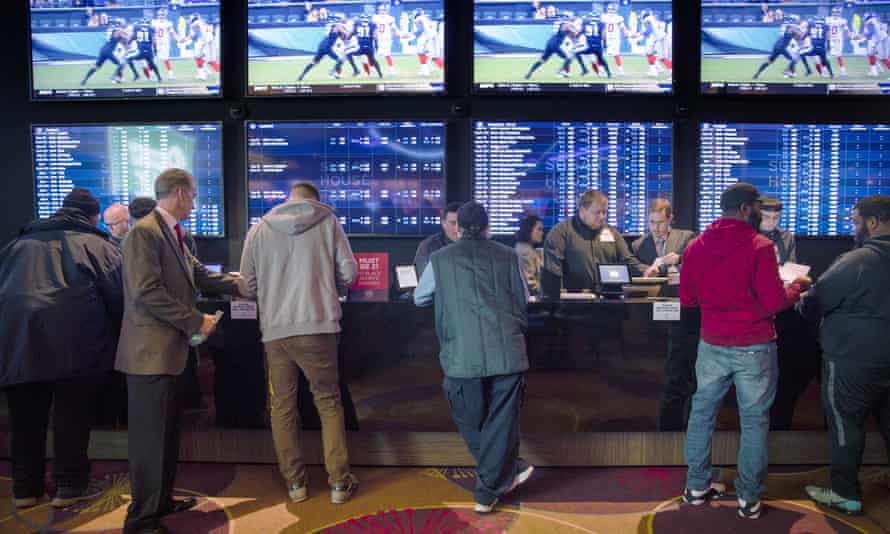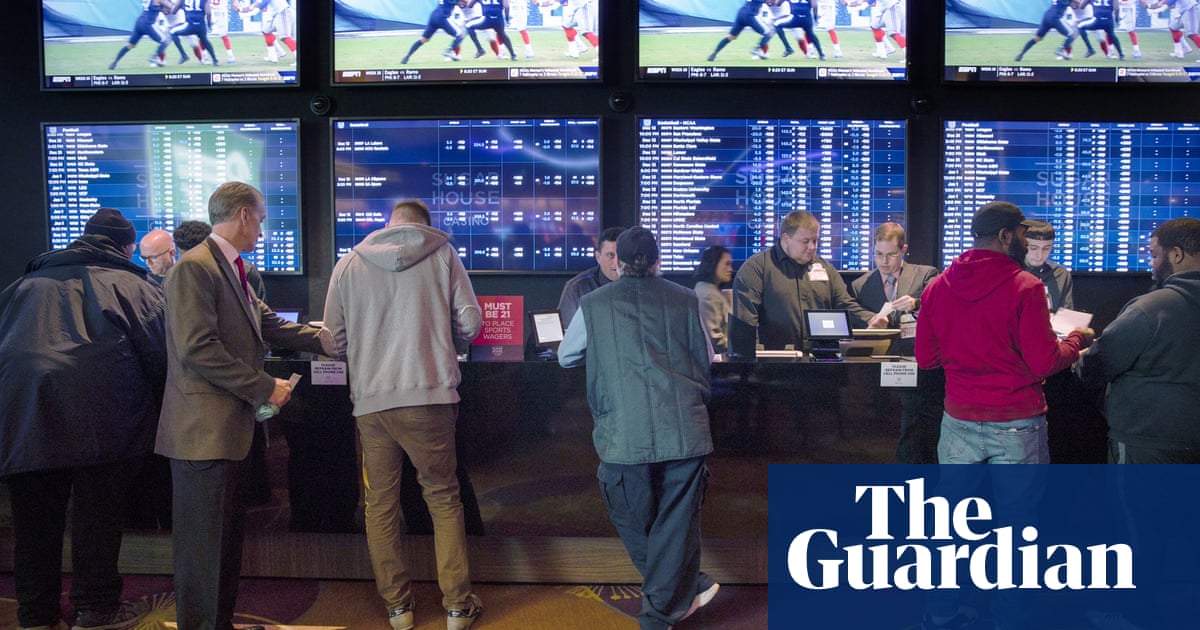I saw betting’s toxic sludge swamp Australian sport. Now it’s coming for America
As sports gambling becomes legal in more and more US states, I remember how it slowly took over the social lives of my friends back home

Last modified on Tue 21 Sep 2021 10.19 BST
In July, a friend from the old country (Australia) visited New York, where I live, and messaged me to see whether I’d be up for a drink. The European football championship had just entered its knockout stages; once we’d decided which match to watch – Switzerland v Spain – and where, my friend immediately began bombarding me with suggestions for different bets we could place: first goalscorer, half-time score, final score and so on.
On the afternoon we were due to meet, he messaged to say he was running late, then added: “I’ve got $500 on the Swiss to win, $12,500 payout.” Throughout the match he kept checking his phone to keep tabs on updated odds; when Switzerland lost to Spain on penalties, he sank into a gloom that did not lift until his basket of super spicy buffalo wings arrived. For an afternoon, I was transported back to the social world I’d left behind in Australia, and one that’s slowly but surely taking shape in America: a world in which sports betting is a permanent fixture of conversation, a slow-moving magmatic sludge that eventually takes over every space, every interaction, every friendship in which sport plays an important role.
Commercial sports betting has not quite exploded in the three years since the supreme court opened the door to its full legalization throughout the US, but it’s a rising force. Twenty-six states, along with Washington DC, now allow legal sports wagers, eight more than at the start of the last NFL season, and betting ads crop up around most major sports events. The economic and social toll of gambling are well known. Australians lost AU$23.7bn on gambling – or AU$1,251 for each person in the country over the age of 18 – in 2017. And while most of that went on slot machines (known as pokies in Australia) the fastest rise was in sports betting, with a 15% increase over the previous year. And that rise is helped by the rise of sports betting apps, which are huge in Australia and are now being pushed here in the US.
Less well documented is how legal sports betting changes the fabric of social interaction for those who, like me, have no interest in gambling but are friends with people who do. To the gambling and non-gambling sports fans of America, take it from me: your world is about to change forever, and not for the better.
Commercial sports betting has been legal in Australia for almost 30 years. Growing up in Sydney in the 1990s and 2000s, I spent many days getting drunk in pubs – but going to the pub also meant engaging with the world of gambling, since most pubs had legal sports betting rooms attached to them. As a child I’d always imagined my young adulthood would be spent in impassioned discussion about politics, literature or other affairs of the mind. Instead I spent it sitting in sticky-carpeted pub side rooms sipping lukewarm beers while so-called “mates” flapped back and forth between the betting card boxes and the register, claiming that “El Masri for first points scorer in Eels-Bulldogs could be worth a look” or shouting “GET UP YOU MONGREL!” at a dog race entering its final straight. All of which was, even for a non-gambler like me, terrifically enjoyable stuff – for the first five minutes or so.
Things became even worse once sports gambling went fully digital; betting friends would turn up at social gatherings with a glazed-over, half-absent expression on their faces, then quickly become engrossed in the betting apps on their phones or excuse themselves to “go have a flutter.” We’re all distracted by our phones now, of course, but there’s more dignity in distraction by even the most mediocre meme than there is in distraction by the latest odds on the color of the Gatorade shower at the end of the Bills-Giants game. Once sports betting takes a hold in your social circle, there’s no going back: whole years of conversation stretch before you in which you will have to feign interest in the odds on offer for things like “race number four from Mooney Valley” or “most full-season unconverted tries,” matters to which you never imagined you would turn your mind and feel slightly diminished to be forced to even contemplate.
The problem is not simply that, in a gambling-saturated sports culture, betting – and its bewildering variety of wagers – become an immovable part of the social furniture, it’s that so many of the things that culture forces you to think about are so profoundly stupid. Prop bets – wagers on events that have no effect on the final game outcome – end up taking away a lot of the fun and spontaneity that’s involved in being a sports fan: the tactical debates, the arguments over who should be fired and who should be hired, the exaggerated rivalries and makeshift alliances, the joys of competition. Instead they turn the business of being a fan into pure business, with trivialities center-stage. A gambling-saturated sports culture is one in which fans are fully engaged, but to idiotic ends: to debating Patrick Mahomes’s over-under on passing yards or how Tampa Bay’s running backs will end up on a rushing yards-touchdowns two-for-one.
It’s also a culture that is incredibly harmful for anyone susceptible to a gambling problem. Like Australia, and increasingly the US, betting ads are everywhere in the UK. The former Arsenal and England star Paul Merson, who estimates he has lost £7m ($9.6m), due to his gambling addiction told the Guardian’s Donald McRae about how those ever-present adverts affected him. “It’s so in your face now,” he said. “People are virtually telling you on the telly you can’t watch football without gambling. Imagine what it triggers in me? Even when I’m driving in the car at seven in the morning and an advert comes on for the prices of a football match in 13 hours’ time, that’s a major trigger. They’ll give the odds on Man United and something in my brain goes: ‘That ain’t bad.’”
Similar to NFTs and the fantasy of fan-player proximity that social media promises, sports betting is part of the package of “innovations” that the corporate controllers of global sport have engineered to increase fans’ emotional and financial investment in teams, while diminishing our collective representation in those teams’ direction. It’s the exemplar of a sporting economy that promises global connection while delivering universal distraction, in which sport’s governing bodies give us more and shinier toys to play with, even as we all sink deeper into the depression of empty engagement and meaningless expenditure. And it’s coming to America soon.
